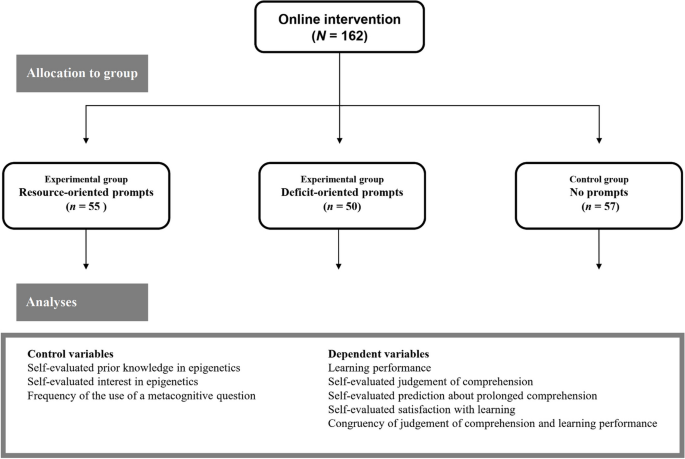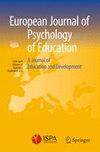生物文本阅读中提示能改变元认知准确性吗?
IF 2.8
2区 心理学
Q2 PSYCHOLOGY, EDUCATIONAL
引用次数: 0
摘要
元认知准确性是指主观评价和客观测量的学习表现的一致性。参考提示利用框架和工作记忆的嵌入过程模型,我们提出提示影响学习过程中的注意过程。通过引导提示,学习者在学习过程中将注意力放在特定的信息上。我们假定在形成理解判断时将考虑到这些信息。随后,元认知准确性将被改变。基于对职前生物教师的在线研究结果,我们既不能证实也不能否定我们的主要假设,假设提示对元认知准确性的影响很小(如果有的话)。资源导向型提示和缺陷导向型提示对学生的学习绩效和理解判断没有影响。自我评价的其他测量(即对学习结果的满意度和对长期理解的预测)不受提示的影响。本研究仅为提示对元认知准确性的改变和信息加工的影响提供了初步证据。在在线学习环境中,与课堂环境相比,快速实施的有效性可能受到限制。我们提供了在学习环境中使用提示的建议,目的是促进其有效性,因此资源导向和缺陷导向的提示都可以促进元认知技能的发展,如果它们得到适当的应用。本文章由计算机程序翻译,如有差异,请以英文原文为准。

Can metacognitive accuracy be altered through prompting in biology text reading?
Abstract Metacognitive accuracy is understood as the congruency of subjective evaluation and objectively measured learning performance. With reference to the cue utilisation framework and the embedded-processes model of working memory , we proposed that prompts impact attentional processes during learning. Through guided prompting, learners place their attention on specific information during the learning process. We assumed that the information will be taken into account when comprehension judgments are formed. Subsequently, metacognitive accuracy will be altered. Based on the results of this online study with pre-service biology teachers, we can neither confirm nor reject our main hypothesis and assume small effects of prompting on metacognitive accuracy if there are any. Learning performance and judgment of comprehension were not found to be impacted by the use of resource- and deficit-oriented prompting. Other measurements of self-evaluation (i.e. satisfaction with learning outcome and prediction about prolonged comprehension) were not influenced through prompting. The study provides merely tentative evidence for altered metacognitive accuracy and effects on information processing through prompting. Results are discussed in light of online learning settings in which the effectiveness of prompt implementation might have been restricted compared to a classroom environment. We provide recommendations for the use of prompts in learning settings with the aim to facilitate their effectiveness, so that both resource-oriented and deficit-oriented prompts can contribute to metacognitive skill development if they are applied appropriately.
求助全文
通过发布文献求助,成功后即可免费获取论文全文。
去求助
来源期刊

European Journal of Psychology of Education
PSYCHOLOGY, EDUCATIONAL-
CiteScore
6.30
自引率
3.30%
发文量
63
期刊介绍:
The European Journal of Psychology of Education (EJPE) is a quarterly journal oriented toward publishing high-quality papers that address the relevant psychological aspects of educational processes embedded in different institutional, social, and cultural contexts, and which focus on diversity in terms of the participants, their educational trajectories and their socio-cultural contexts. Authors are strongly encouraged to employ a variety of theoretical and methodological tools developed in the psychology of education in order to gain new insights by integrating different perspectives. Instead of reinforcing the divisions and distances between different communities stemming from their theoretical and methodological backgrounds, we would like to invite authors to engage with diverse theoretical and methodological tools in a meaningful way and to search for the new knowledge that can emerge from a combination of these tools. EJPE is open to all papers reflecting findings from original psychological studies on educational processes, as well as to exceptional theoretical and review papers that integrate current knowledge and chart new avenues for future research. Following the assumption that engaging with diversities creates great opportunities for new knowledge, the editorial team wishes to encourage, in particular, authors from less represented countries and regions, as well as young researchers, to submit their work and to keep going through the review process, which can be challenging, but which also presents opportunities for learning and inspiration.
 求助内容:
求助内容: 应助结果提醒方式:
应助结果提醒方式:


